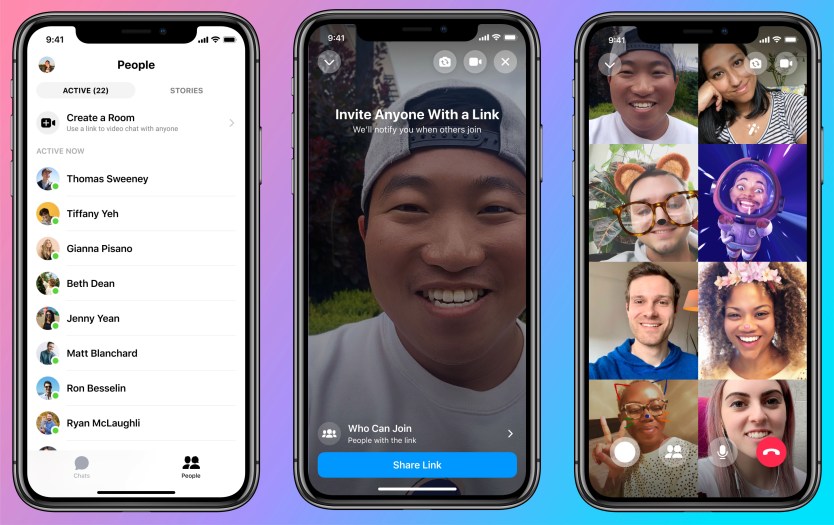Messenger Rooms are Facebook’s answer to Zoom
- Messenger Room is Facebook’s response to the popular video chat app Zoom, which saw its usage spike during the coronavirus health crisis.
- Zoom has been the subject of plenty of criticism lately because of various privacy and security issues the company promised to fix, but that didn’t affect its popularity.
- The first screenshots of Messenger Room have appeared online, but it’s unclear when the app will go live.
- Visit BGR’s homepage for more stories.
The only way to limit the spread of the novel coronavirus is to adhere to a specific set of rules. You have to wash your hands often and disinfect surfaces, and you have to reduce contact with other people. Even then, you’re advised to use a face mask of some sort and use sanitizer when in public. These severe social distancing measures have cost millions of people their jobs. Others are luckier and can work or go to school from home.
The internet, combined with video calling apps and instant messengers, makes it far more comfortable to work or study from home. Apps like Zoom are killing it right now, despite the many privacy and security worries that were unearthed in previous weeks. Unsurprisingly, if an app that has a social component becomes popular for any reason, Facebook will be right there to try to replicate its features as well as its success. And Facebook is doing exactly that with Zoom, as it lines up its own competitor for the popular video calling application.
To be fair, it’s not just Facebook that’s bolstering its video calling feature. Google rebranded Hangouts for G Suite customers to Meet and rolled out a few features that were first available for Zoom. Facebook’s WhatsApp is expected to double the number of people supported on the same video call to eight, in response to the enormous demand for video chat apps during the pandemic. So it only makes sense for Facebook to develop a Zoom-like app inside its popular Messenger chat app. After all, Facebook did notice a significant increase in video calling activity in the early days of the pandemic, and that sort of demand won’t disappear anytime soon.
 Image Source: Facebook
Image Source: FacebookCalled Messenger Rooms, Facebook’s Zoom alternative will be available inside the standalone Messenger app for Windows and Mac. Italian blog AggiornamentiLumia was first to share screenshots of the feature before Facebook announced the official rollout of Messenger Rooms.
As the name suggests, the feature will let you create Rooms to talk with friends. Once a Room is created, you’ll be able to add up to 50 people, regardless of whether they have a Facebook account or not. Anyone with a Facebook account can use it to log into Messenger. Otherwise, you’ll need the link to the room, which can be used in a browser.
The Rooms app will let you activate and deactivate the video stream, just like in Zoom or Meet, and share the screen of your PC or mobile device. Soon, Facebook will add Rooms functionality to Instagram Direct, WhatsApp, and Portal devices as well.
 Image Source: Facebook
Image Source: FacebookFacebook explained the privacy and security features built into Messenger Rooms in a separate announcement, as well as the data it collects from your Rooms activities:
Regardless of whether you use Rooms through your Facebook account or join as a guest, we don’t watch or listen to your audio or video calls.
When you join a room through Facebook or Messenger, call participants who you aren’t friends with on Facebook will be able to see and hear whatever you say or share in the room, but they won’t gain any greater access to your profile or information in other parts of Facebook. They’ll only be able to see information that they otherwise would have been able to see such as your name and public Facebook profile information, what you’ve posted publicly or content in a group you’ve both joined. […]
As with other parts of Facebook, we collect data from Rooms regardless of whether you joined through one of our apps or without logging into an account. The main purpose of this data is to provide the service and improve the product experience. As with other Messenger features though, audio and video from Rooms won’t be used to inform ads. And, we don’t show ads in Rooms.
Messenger Rooms, however, aren’t end-to-end encrypted, Facebook also explains. Instead, it’s encrypted only in transit from your device to Facebook’s servers.
Image Source: Richard Drew/AP/Shutterstock

Chris Smith started writing about gadgets as a hobby, and before he knew it he was sharing his views on tech stuff with readers around the world. Whenever he's not writing about gadgets he miserably fails to stay away from them, although he desperately tries. But that's not necessarily a bad thing.
tinyurlis.gdv.gdv.htu.nuclck.rushrtco.detny.im
